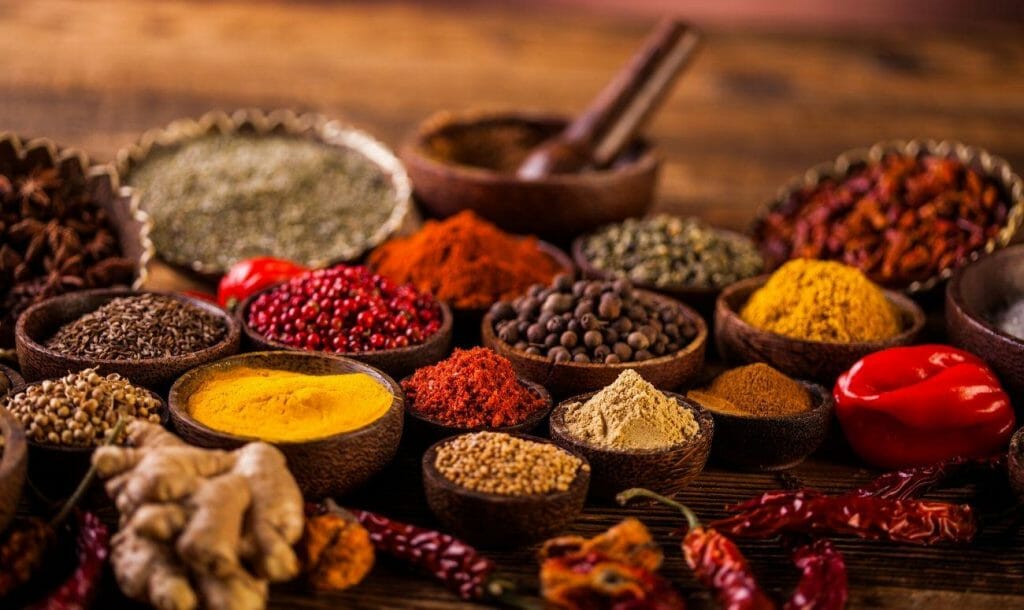India, the rich land of spices and flavours, is bestowed with a variety of cooking styles and regional specialities. The colourful influence of India’s religious, cultural and historical heritage plays a major role in providing us with an abundance of Indian cuisine. And the spices pack a flavourful punch that elevates the dullest of dishes to the most mouth-watering recipes. But who would have thought that these rich spices could help us heal our gut health?
How do spices help our gut health?
The addition of herbs and spices in our food helps the digestive system break down the food we consume and enables our gut to absorb the nutrients required effectively. Your gut microbiome functions in a delicate balance. It comprises of a number of microbes in your digestive system and influences everything from body inflammation to mental function. By regulating and keeping a good number of bacteria within the microbiome, you heal your gut health and encourage healthy digestion.
Studies have shown that many spices stimulate the liver, increasing bile secretion with a higher percentage of bile acid. This is important for fat digestion and nutrient absorption. Some spices are also said to improve food transit time in the gastrointestinal tract. This means it helps you digest food better and prevents constipation and the building of unhealthy bacteria.
Which spices are best for digestion?
Ginger
Full of phenolic compounds that relieve gastrointestinal irritations, ginger is a powerhouse when it comes to spices. It stimulates saliva and bile production and also enhances intestinal lipase activity, which is needed for good digestion.
Ginger relaxes the intestinal muscles and allows digested food to pass smoothly. By alleviating intestinal contractions, the spice helps with cramping and can even be a fantastic alleviator of menstrual cramping. The spice is also good for reducing gas and bloating and can heal you of other gastrointestinal distress as well, like nausea that takes place due to morning sickness or chemotherapy.
How can you include ginger in your diet?
Well, ginger is one of the most common spices used in all Indian recipes. But if you really wish to reap the benefits of this wonder food, try starting your mornings with a soothing cup of hot ginger tea. This not only awakens sluggish digestion but also works as a detoxifier.
Cardamom
Used in Chinese and Ayurvedic medicine for centuries, cardamom is a part of the ginger family and boasts just as many benefits. Thanks to its carminative properties, it alleviates bloating and gas and slows the rate of stomach muscle cramping due to its antispasmodic properties.
The spice stimulates hunger while also reducing gas, nausea, indigestion, and cramping. One of the most wonderful benefits of this spice is it kills off food-borne bacteria found in the digestive tract. This protects our gut from diseases like food poisoning and gastric distress.
Cardamom pods also contain something called limonene. This compound dissolves cholesterol-filled gallstones and also relieves heartburn and gastroesophageal reflux or GERD. The antioxidant properties of cardamom make it a mineral powerhouse. Apart from reducing your bloating, water retention, swelling and edema, the spice can be a rich source of iron, manganese, calcium and magnesium.
How can you include cardamom in your diet?
Cardamom makes for a great addition to sweet and savoury dishes. The sweet yet spicy tasting superfood can be added to curries, breakfast recipes, casseroles, pies, mithais and much more. On days you’re feeling uninspired, simply add a few opened and crushed cardamom pods in your morning ginger tea. If you prefer it raw, chew on a few pods to relieve tooth and gum pain and also prevent infection.
Fennel
Fennel, just like cardamom has wonderful carminative properties that stimulate the production of gastric juices. Consumed as an after-dinner digestive, the spice also has antispasmodic properties that help with our digestion. Now you know why Indian restaurants and homes always offer an after-meal serving of fennel.
The spice is rich in dietary fibre; it consists of metabolically inert insoluble fibre that helps ease constipation and protects the colon. Additionally, studies prove that fennel seeds contain antimicrobial, antifungal and anti-inflammatory properties which make them the perfect protection from ageing and diseases like cancer.
How can you include fennel in your diet?
A textbook trick that all Indian households have tried is roasting a handful of fennel seeds on a pan to make them golden brown and using this roasted perfection to make dishes flavourful. You can also crush or grind the seeds to release more oil and flavour.
If you’re not a fan of crushed fennel seeds, try adding it to your breakfast recipes. An easy trick is to add a tablespoon of the seeds to dosa or idli batter.
Fennel seeds can also be soaked to create natural gripe water for babies. It is said to relieve gassiness and colic in infants.
Remember to always store these spices in clean and airtight containers. Keep them away from heat and light and opt to refrigerate spices that you think are prone to spoiling.
Read more: 6 Benefits Of Morning Walks
Like & Follow ThinkRight.me on Facebook, Instagram, Twitter, and Telegram to stay connected.






























